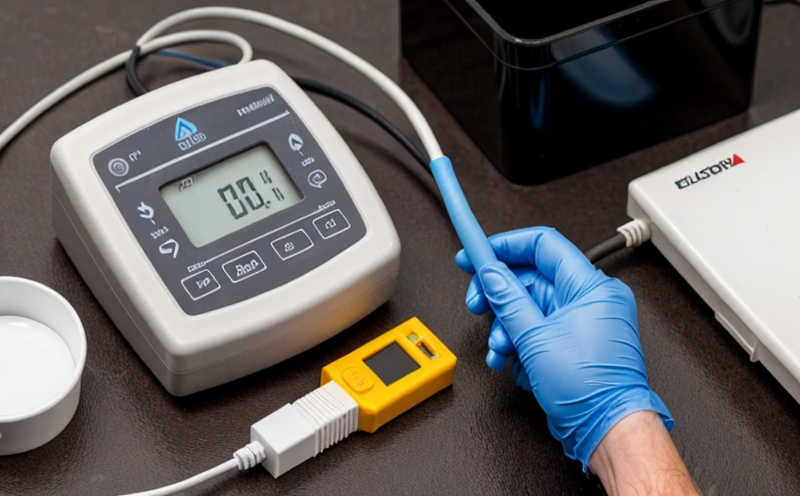ISO 13100 Electrochemical Testing for Metal Corrosion
The ISO 13100 series of standards provides a standardized approach to electrochemical testing methods, particularly suited for assessing the resistance to corrosion in metallic materials. This service focuses on implementing and interpreting ISO 13100:2018 Electrochemical Measurement Techniques for Testing Metal Corrosion, which is widely recognized as an essential tool in quality management, compliance, and research & development (R&D) environments.
The primary goal of this electrochemical testing methodology is to provide a consistent and reliable means to measure the rate and mechanism of corrosion. The test involves placing a metal specimen into a controlled environment where it can interact with corrosive agents such as water or specific chemical solutions, depending on the material type being tested. The interaction between the sample and its surroundings generates an electric current that is measured using specialized equipment.
Understanding the electrochemical behavior of metals under various conditions helps manufacturers and quality managers to identify potential issues early in the product lifecycle. This allows for improvements in design, materials selection, or production processes which can significantly extend the service life of metallic components used across industries like automotive, aerospace, construction, and manufacturing.
For instance, in the automotive sector, determining the corrosion resistance of metal parts is crucial to prevent costly recalls due to premature failures. In R&D environments, electrochemical testing provides insights into how different environmental factors such as temperature, humidity, or salinity affect material integrity over time. Compliance officers use these tests to ensure that products meet stringent international standards like ISO 13100, thereby avoiding non-compliance penalties.
The methodology typically involves setting up a three-electrode cell system consisting of the sample (working electrode), a reference electrode, and a counter electrode immersed in an electrolyte solution. The current between these electrodes provides quantitative data on corrosion rates which can then be compared against baseline data or industry benchmarks.
| Electrochemical Testing Parameters | Description |
|---|---|
| Current Density (µA/cm²) | The rate of current flow per unit area which indicates the corrosion rate directly. |
| Potential Difference (mV) | The difference in electrical potential between the working electrode and reference electrode, indicative of the anodic or cathodic reactions occurring on the surface. |
| Resistance (Ω) | A measure of how much resistance is encountered by current flowing through the electrolyte, reflecting the integrity of the protective layer if present. |
| Time Duration (hours) | The length of time the test runs, influencing the extent and intensity of corrosion observed. |
This approach allows for detailed analysis, including identifying areas prone to localized corrosion or assessing the effectiveness of protective coatings. By adhering strictly to ISO 13100 protocols, laboratories can ensure accurate results that are comparable across different facilities worldwide.
Scope and Methodology
The scope of this electrochemical testing encompasses a wide range of metallic materials used in various industries. Materials include but are not limited to stainless steel, aluminum alloys, titanium, copper, and nickel-based alloys. The tests cover both laboratory conditions simulating real-world scenarios as well as accelerated aging processes that mimic prolonged exposure times.
The methodology adheres closely to ISO 13100:2018 guidelines, ensuring precision and repeatability in measurements. Key aspects include:
- Use of standardized electrolytes tailored to the specific metal being tested
- Controlled temperature and humidity conditions during testing
- Calibration of all equipment before each test run
- Data logging and analysis throughout the entire process
The results generated from these tests are invaluable for decision-making processes within organizations. They help in optimizing product performance, ensuring regulatory compliance, and reducing risks associated with material failures.
Why Choose This Test
- Accurate Measurement: Provides precise quantification of corrosion rates and mechanisms using electrochemical techniques.
- International Standard Compliance: Ensures that all testing aligns with ISO 13100 standards recognized globally.
- Comprehensive Analysis: Offers insights into different forms of metal corrosion including pitting, crevice, and intergranular types.
- Cost Efficiency: By identifying potential issues early in the design phase, organizations can avoid costly repairs or replacements later on.
- Regulatory Requirements: Meets necessary criteria set by regulatory bodies ensuring products are safe for end-users.
- Innovative Research: Supports cutting-edge developments in materials science and engineering through detailed analytical capabilities.
Selecting this service guarantees that you have access to comprehensive electrochemical testing services conducted according to the highest industry standards. This ensures your organization stays ahead of competitors by maintaining high-quality products while adhering strictly to legal requirements.
Use Cases and Application Examples
Eurofins offers a wide array of electrochemical tests compliant with ISO 13100:2018, tailored specifically for your unique needs. Below are some practical applications where our expertise shines:
- Aerospace Industry: Testing the durability and longevity of aircraft components exposed to harsh environmental conditions.
- Automotive Sector: Evaluating the performance of engine parts subjected to high temperatures and aggressive chemicals.
- Construction Field: Assessing structural integrity of metal reinforcements in concrete structures facing sea spray or industrial pollutants.
- Manufacturing Industry: Determining the resistance of manufacturing tools against corrosive environments during production runs.
- R&D Projects: Investigating new materials and coatings for enhanced corrosion protection.
Our experienced team will work closely with you to understand your specific requirements, whether it's a one-off test or ongoing support. Our state-of-the-art facilities and skilled personnel ensure that every aspect of the testing process meets international standards while delivering reliable results.





